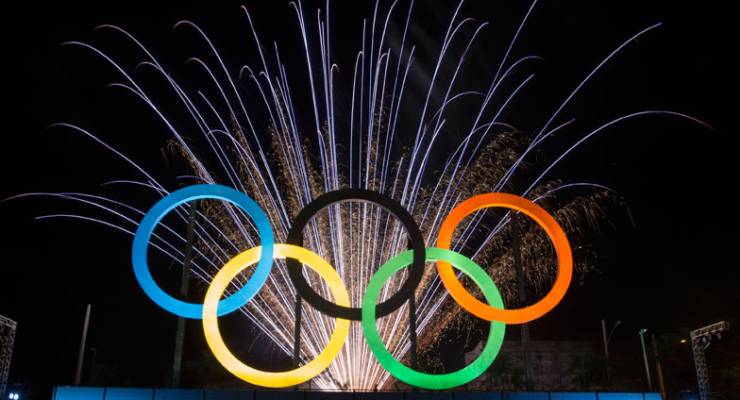
The Australian Olympic Committee is suing Telstra over an advertisement for false and misleading conduct over advertisements for the telco’s new app with Channel Seven — launched specifically to broadcast next month’s Rio de Janeiro Games.
Last week Telstra was forced to alter its ads, which said Telstra was the “official technology partner to Seven’s Olympic Games broadcast”. The AOC said Telstra had associated itself with the Games without permission and without being an official partner.
The International Olympic Committee guards its brand jealously. On Friday the AOC filed an action in the Federal Court, claiming Telstra’s campaign deceived consumers by claiming to be a sponsor of the Australian Olympic team. Over the next few months the IOC will undoubtedly send many cease-and-desist letters to advertisers, and broadcasters will tiptoe around regulations for reporting on the games. But why?
What restrictions does the Olympics put on advertisers?
Unless a company is part of the IOC’s specific partnership program, it can’t use the word “Olympics”, the iconic five-rings symbol or the specific logo for the current Olympics, as well as a host of other word combinations such as “Rio 2016”, “Rio Paralympics” and basically any way you can think of putting “Rio” and “Olympics” together. The companies that can do this have paid big dollars to do it.
The IOC says sponsorship makes up 40% of the revenue it needs to pay for putting on the Games. Between 2009 and 2012 that was almost US$1 billion from the Olympics’ global partners, and then there are also numerous domestic partners, which cover a single country. For the Beijing Olympics, that brought in US$1.218 billion, and London was worth US$1.15 billion to the IOC.
What restrictions are on broadcasters?
The IOC’s other major source of revenue is broadcasters, who also pay big money to show athletes run, jump and swim their way to medals and glory. The IOC says that broadcasting revenue has been its single biggest source of revenue for the past 30 years, with the London Games bringing in more than $2.5 billion to the IOC. The amount that broadcasters pay has been dropping though, and is unlikely to turn a profit for Channel Seven in Australia, but has other benefits. For news outlets this can also pose a problem — remember the ABC’s Michael Rowland re-enacting Sally Pearson’s gold medal in the 100-metre hurdles with Lego? It was because the ABC didn’t have the rights to the footage.
Why does the Olympics protect its brand so much?
According to Stephen von Muenster, principal at von Muenster Solicitors and Attorneys, who advises brands in this area, it’s because the brand is so valuable to both the IOC and to advertisers. “It’s one of the most recognised brands in the world,” he told Crikey.
Billions of eyeballs will be focused on the Olympics, which means it is worth billions of dollars to advertisers involved in the Games. It costs more than $100 million to be a global partner of the Olympics, but do brands like McDonalds and Visa see returns on that? The IOC definitely has a concrete source of revenue to protect. Von Muenster says the return on investment for the sponsors can’t necessarily be measured in terms of dollars in and dollars out, especially for the big brands that sponsor the Games at a global level.
“It goes more to brand than to sales. Brands are more than numbers — it’s about brand and recognition. I don’t think it’s like a sales promotion and you can measure the number of burgers sold,” he said.
He says it needs to be measured both in a qualitative and quantitative way.
“To be associated with it can’t be a bad thing, that’s why it’s so protected — it’s so valuable. For those that don’t pay a cent for it to leverage off it, it’s probably a good thing to stop it. But everyone wants to cosy up on the goodwill on it,” von Muenster said.
How do brands get around the rules?
Just because the IOC protects its brand so diligently doesn’t mean businesses don’t find a way around it. This is called “ambush marketing” and advertisers have used creative ways in the past to get people to associate the brand with the Olympics, without mentioning the word. There will be many sports-themed advertisements over the next six weeks, but many of these will be piggy-backing on the vibe of the Games, without actually mentioning them.
There’s also sponsorship of individual athletes, which the IOC also limits. In the past the IOC has banned participants in the games from talking about their own sponsors or appearing in their advertising between specific dates surrounding the Games. In Rio, players will be able to appear in advertising for their own sponsors, as long as the ads don’t mention the Olympics or Rio. And they need to submit the ads to the IOC in advance for approval.








Crikey is committed to hosting lively discussions. Help us keep the conversation useful, interesting and welcoming. We aim to publish comments quickly in the interest of promoting robust conversation, but we’re a small team and we deploy filters to protect against legal risk. Occasionally your comment may be held up while we review, but we’re working as fast as we can to keep the conversation rolling.
The Crikey comment section is members-only content. Please subscribe to leave a comment.
The Crikey comment section is members-only content. Please login to leave a comment.